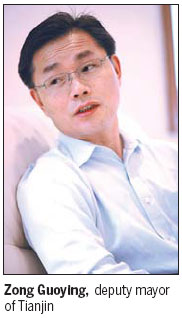Daily life
Change of tide for Tianjin
By Zhao Yinan (China Daily)
Updated: 2013-03-04

Port city sets its sights on boosting free-trade zone, deputy mayor says
Plans to transform the northern port city of Tianjin into an international trading hub have taken a major step forward, winning support in principle from the central government, according to the city's deputy mayor.
The favorable policies for the Dongjiang Free-Trade Zone in the eastern part of the city's Binhai New Area will include transit visas, a reduction or exemption in tariffs and streamlined procedures for ships and cargo handling, said Zong Guo-ying, who is also director of the new area and a deputy to the National People's Congress.
Tianjin's plan to inject more incentives into Dongjiang has received backing from the State customs, taxation and commerce authorities, Zong said.
The visa-free policy is expected to result in more hotel bookings and shopping in the downtown area, he explained, although he declined to reveal a timeframe in the policy to allow transit passengers to tour the port city.
After successes in Shenzhen and Shanghai's Pudong New Area, China's leaders are looking to Tianjin to become another economic growth driver.
The State Council approved a blueprint in 2006 for the Dongjiang Free-Trade Zone, the first stage of which covers 10 sq km.
Five years later, six container berths have been set up along the 2.3-km coastline in Dongjiang, while inspection, logistic processing and customs offices have come into service. In 2012, the total value of imports and exports going through Dongjiang reached $5 billion, a 116 percent year-on-year increase.
About 80 leasing companies were headquartered in the city as of June, about 23 percent of the national total, according to Dongjiang's website.
Although the area is now the largest of China's four free-trade zones, it still cannot offer services equivalent to internationally renowned port cities such as Hong Kong and Singapore, Zong said.
"An imminent task for us is to further promote supporting facilities, including the distribution system, simplified shipping registration and financial leasing to companies," he said. "In short, we will make a free-trade area that is in line with international standards to attract financing, talent and cargo."
Liu Xianming, deputy director of the economic development administration at Binhai High-Tech Industrial Development Area, said Binhai has provided comfortable residential districts equipped with leisure and entertainment facilities to enrich the daily life of its professional experts from China and abroad.
The city is also planning reforms to its hukou, or household registration system, since many non-residents employees are at a disadvantage when receiving medical care or education for their children.
About 1,500 migrant workers a year are entitled to receive welfare equal to a Tianjin hukou holder, one of the pilot reform policies.
"Economic incentives cannot solely sustain the city's development," Zong said. "We need to offer competitive welfare for talented people as well as financial services for companies."
Jin Lianjie, a specialist in port planning at the Transport Planning and Research Institute in Beijing, agreed.
"Tianjin is not an ideal port, because it can occasionally freeze during winter. But its logistics, transportation and its established status as an exit point for inland provinces in northwest China to ship cargo to the outside world have made it a competitive choice, compared with other ports on the Bohai Sea," she said.
zhaoyinan@chinadaily.com.cn
(China Daily 03/04/2013 page8)
